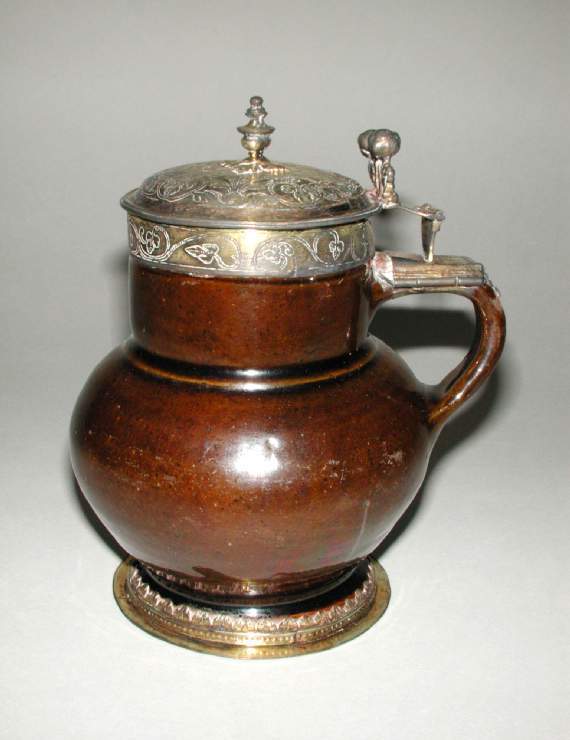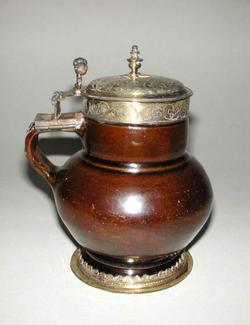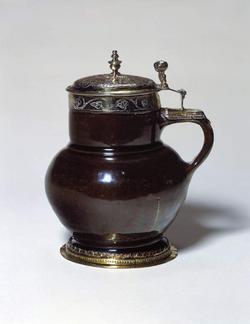Current Location: Gallery 27 (Glaisher)
Maker(s)
Pottery:
Unknown
Silversmith:
Unknown
Entities
Categories
Description
Lead-glazed earthenware mounted in silver-gilt with engraved decoration
Red earthenware, thrown, with treacly-brown lead-glaze, the mount on the neck, and cover of silver-gilt with engraved decoration. The pot has a bulbous body with a projecting foot, a short cylindrical neck, and an applied loop handle. Round the foot it has a toothed silver-gilt mount with a projecting flat border. The base is incised with a cross with W and N beside it
Notes
History note: Miss Lilian Coats (d. 1954), Fornethy House, by Aleth, Perthshire; the Executors; sold Christie's, 21 July 1954. . . . The late Miss L. Coats removed from Fornethy House, Perthshire, lot ; Thomas Lumley, London from whom purchased
Legal notes
Given by the Friends of the Fitzwilliam
Measurements and weight
Height: 14.9 cm
Height: 6 1/8 in
Width: 5 1/8 in
Acquisition and important dates
Method of acquisition: Bought
(1954-10-21)
by
Lumley, Thomas
Dating
16th Century, Mid
Circa
1545
CE
-
1560
CE
Note
Between about 1530-90 there was a fashion for pottery drinking vessels with silver-gilt or silver mounts and covers. It began in Court circles and spread gradually to the country gentry, prosperous yeomen and merchants. In 1558 Etienne Perlin noted in his 'Description of England' that the English drank great quantities of beer, not 'out of glasses, but from earthern pots with silver handles and covers, and this even in houses of persons of middling fortune'. Most of these pots are of brown salt-glazed stoneware from the Rhineland or coloured tin-glazed earthenware from the Low Countries. Their silver covers and mounts which protected the edges and gave them a more luxurious appearance, were made in London or a few other towns, such as Exeter and Norwich. Brightly coloured Isnik pottery jugs imported from Turkey were also treated in this way (see M.16.-1948). Mounted lead-glazed earthenware pots, which were probably made in England, are less common. This example shows the squat, short-necked form popular during the mid-sixteenth century. A taller pot in the Victoria and Albert Museum has mounts with London hallmarks for 1546-47.
No marker's or hallmarks on the silver
School or Style
Renaissance
Tudor
Components of the work
Cover
composed of
silver-gilt
Mounts
composed of
silver-gilt
Body
Mount
Materials used in production
Lead-glaze
Earthenware
Inscription or legends present
- Text: a cross with W beside left arm and N to left of upright arm
- Location: On base
- Method of creation: Incised
- Type: Possible maker's mark
References and bibliographic entries
Identification numbers
Accession number: M.5-1954
Primary reference Number: 77311
Stable URI
Audit data
Created: Saturday 6 August 2011
Updated: Monday 29 April 2024
Last processed: Tuesday 13 May 2025
Associated departments & institutions
Owner or interested party:
The Fitzwilliam Museum
Associated department:
Applied Arts






